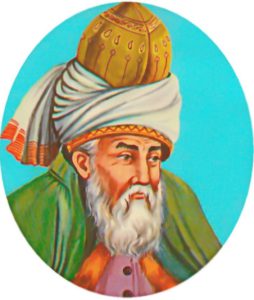Hailing from Oakland, California, Ronah Baha is an MA candidate in Gender Studies at SOAS, University of London. Her current research examines the relationship between Afghan-American diasporic nostalgia and visual representations of Afghan women from the 1960s and 1970s. Her other interests include migration, literature, food, and the Persianate world.
“How does one uproot the poem from its cultural soil and replant it in an unaccustomed earth?”
-Aria Fani, “Rewriting Hafez: Re-theorizing Untranslatability in Persian Poetry.”
In a 1994 performance at the Geraldine R. Dodge Poetry Festival, American poet and scholar Coleman Barks begins: “All the poems tonight are the words of a thirteenth century mystic, Jalaluddin Rumi. I think that’s all I’ll say.”
But they are not the words of Rumi. They are the words of Coleman Barks.

A typical depiction of Rumi. Yeni Capi, Istanbul.
Muhammad Jalaluddin Rumi Balkhi, known simply as Maulana among speakers of his native Persian, was a thirteenth century Islamic scholar and Sufi poet born in what is now Afghanistan. Raised in a devout clerical family, he studied Qur’an as a youth before moving to Konya, in modern Turkey, where he wrote the bulk of his literary corpus. Today, his Divan-e Shams-e Tabriz and Masnavi-e Manavi are among the most revered texts in the classical Persian literary canon. In the Persianate world, his poetry is referenced in modern literature, music, and everyday vernacular, among the literate and illiterate alike. Some even refer to his Masnavi as the “Qur’an in Persian.”
And since the 1990s, he has been called the best-selling poet in the United States. This is overwhelmingly the work of Coleman Barks, who has devoted the past forty years of his career to writing and publishing books of Rumi’s poetry. While his works are typically branded as translations, Barks does not actually have any proficiency in Persian. Rather than working with original text, therefore, he formulates new, free-verse iterations of the classical poems from pre-existing scholarly translations. Rumi scholars such as Franklin Lewis refer to Barks’ renderings not as translations, but as versions.
Though unable to access the works in their original form, Barks is undeniably a Rumi devotee. At the poetry festival, he revels in his recitations. The audience listens as his slow, southern drawl lends gravitas to the poems, which sound more derivative of the existentialist zeitgeist of early 20th century America than the Sufi mysticism of 13th century Anatolia. A live band accompanies him, bassist plucking a mellow blues rhythm, alto saxophone crooning, sparing piano contributing an air of mystique. Every now and then, he smiles softly to himself, then looks up to beam out at the audience.

Barks reciting poetry to a small audience at the Festival of Silence, Norway. Haakon Thue Lie.
Born in Chattanooga, Tennessee in 1937, Barks is a scholar of English literature and a poet in his own right. Prior to embarking on his Rumi career, he taught creative writing at the University of Georgia. He is quick to confess that he had not heard of Rumi until 1976, when poet Robert Bly handed him a book of Rumi translations and said, “These poems need to be released from their cages.” In a TEDx talk delivered at the University of Georgia, Barks explained, “What he meant was that they needed to be rephrased out of their stiff translation-ese language into something more akin to the great American tradition of free verse that has come down to us through Whitman and William Carlos Williams and Galway Kinnell.” In other words, they needed to be made intelligible to an American audience, in the context of American literary tradition.
Unsurprisingly, Barks has been the subject of numerous critiques from scholars and journalistic commentators alike. He has been charged with unfaithfully rendering Rumi’s texts, erasing Islam from his works, and contorting the poems to represent palatable forms of spirituality that can be marketed to the mainstream American consumer. There is validity in all of these claims, but I am most interested in the latter charge, but it does not quite ring true that marketability was among Barks’ initial motives. In his TEDx talk, he says of his initial foray into Rumi’s poetry that publishing did not occur to him; rather, “it was a soul-growth practice” that lasted for seven years. To read Barks’ writing or to watch him recite is to witness someone truly enamored with the verse he has created and deeply devoted to the imagined mystic behind it. Through his works, Barks looks to create a rendition of Rumi that is intelligible to him. This endeavor manifests as a form of Orientalism, however subtle: it is Barks’ project to create Rumi in his own image.
In Orientalism, Edward Said writes that Orientalist scholarship is more representative of the culture and values of the Western countries from which it originates than the “Orient” that it purports to study. Barks’ renditions of Rumi’s poetry presume the need to rework the poems to make them intelligible to western audiences; in short, he is invested in creating versions of Rumi’s that can, in all their mystical obscurity, reflect him and his experience as an American. I do not mean to claim that Rumi’s poems are universally intelligible, even in English translation. Rather, I argue that no poetry is universal, and as such, we must be attentive to its context, rather than obscuring it. Oddly, Barks frequently asserts that there is a universality intrinsic to Rumi’s poetry; he cites passages of prose and poetry in which Rumi has said that religious categories do not matter. While it is true that Rumi frequently dismisses worldly divisions, he does so in a distinctly Islamic-Sufi context, invoking a postmortem reunification with God. Barks, crafting his versions of Rumi with reference to Whitman, Williams, and Kinnell, seems to dismiss this context altogether. He thus forecloses the possibility of the kind of literary and cultural exchange that contextualized translation can facilitate.
Of course, Barks is one in a long history of Orientalists divorcing Persian poetry from its context in order to reflect western culture. He is unique, however, in the extent to which he feels a personal connection to his re-workings of Rumi. In a 1995 PBS interview, host Bill Moyers said to Barks, “Sometimes I don’t know where Rumi stops and Barks begins.” Barks’ response was noncommittal, but he did not seem to mind the observation. Moyers was right: the poetry we read in Barks’ works is, in fact, more Barks than Rumi.
Ali, Rozina. The Erasure of Islam from the Poetry of Rumi. The New Yorker.
https://www.newyorker.com/books/page-turner/the-erasure-of-islam-from-the-poetry-of-rumi
Cihan-Artun, Fatma. Rumi, the Poet of Universal Love: The Politics of Rumi’s Appropriation in the West. Doctoral Dissertations May 2014 – Current. February 2016.
http://scholarworks.umass.edu/cgi/viewcontent.cgi?article=1625&context=dissertations_2
Fani, Aria. “Rewriting Hafez: Re-theorizing Untranslatability in Persian Poetry.” Ajam Media Collective. July 8, 2014. https://ajammc.com/2014/07/08/rewriting-hafez-persian-poetry/
Rumi, Jalaluddin and Franklin Lewis. Rumi: Swallowing the Sun: Poems Translated from the Persian. Oxford: Oneworld, 2008.
Said, Edward. Orientalism. New York: Pantheon Books, 1978.
Thornton, Kat. “Rumi for the New Age Soul: Coleman Barks and the Problems of Popular
Translations.” Ajam Media Collective. March 9, 2015. https://ajammc.com/2015/03/09/rumi-for-the-new-age-soul/


Leave A Comment